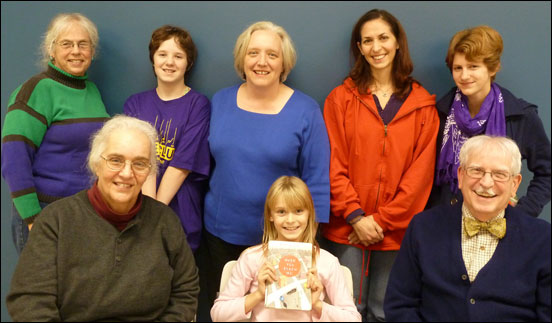
A book group for the ages
An Illinois church's intergenerational book club creates connections.
Phillips surprised even himself with the idea. He says he had “about given up on kids. I had decided I didn’t like them very much, but I thought I really ought to give them one more try.” Three years later, the Intergenerational Book Group is going strong, with regular meetings and members ranging in age from 8 to Phillips’s 70. For Phillips, the group has redeemed a generation. “These kids, I love,” he says.
The Intergenerational Book Group meets at the church every six to eight weeks on Wednesday evenings. At a recent meeting, five adults and three youth gathered, and for a solid hour and forty minutes they thoroughly analyzed When You Reach Me, a young adult novel by Rebecca Stead.
Each member of the group contributed to the discussion, including 8-year-old Karalee Wiviott, Eileen’s daughter and a vocal member of the group. “It’s the best book ever,” says Karalee. “It’s very well-written.”
Twelve-year-old Irene Besser-Gilbert did not hesitate to disagree. “I really liked it. But it’s not the best book ever, because I read The Book Thief.” That novel, by Markus Zusak, ranks high in the book group’s pantheon, along with Harper Lee’s To Kill a Mockingbird and Dark Life by fellow church member Kat Falls.
Eileen Wiviott coordinates the meetings of the group, which started in the fall of 2007. She attended those early meetings with her son, Marty, who was then nine. Though Marty has phased himself out of the group, he still sometimes attends and often reads the current selection. The group chooses children’s novels that are “multilevel and meaty,” Wiviott says.
Wiviott believes the group promotes camaraderie at the 400-member church. “It’s all about deepening our engagement with each other and creating opportunities for people to get to know each other better,” she says. That it is intergenerational, she thinks, is all the better. “It really does work, and it’s pretty cool. There’s some ebb and flow. New people join and partake, and get to know kids that they wouldn’t know otherwise.”
Some of those connections have spilled over outside of the book group. After getting to know each other over book discussions, Phillips and Besser-Gilbert planned a summer worship service together, where they sang a duet.
A seventh-grader, Besser-Gilbert appreciates the opportunity to discuss books on a deep level. “You don’t have to search around for people who’ve read the same book as you,” she says. “At school, it’s hard to find an intellectual discussion of a book.”
The conversation around When You Reach Me ranged from the intellectual to the silly, touching on time travel, homelessness, racism, epilepsy, and mental illness.
Phillips liked how the book, set in the 1970s, and referring to the old game show The $20,000 Pyramid, portrayed New Yorkers from many different walks of life coming together. “We’ve increasingly become a society where kids don’t grow up interacting with people who are any different than they are. We live in places where people are really alike, even in cities,” he says.
Some snippets of the conversation could be overheard only in a Unitarian Universalist church. “I’ve been in OWL long enough to know that you can’t conceive a baby without a father,” says Besser-Gilbert, referring to the church’s Our Whole Lives human sexuality curriculum.
Margie Rogasner, a former teacher, steered the group to address questions about the book’s structure and title. She also produced an interview with the author to provide some insights. And she set the girls in the group atwitter when she revealed that her daughter worked with Daniel Radcliffe, star of the Harry Potter movies.
Fourteen-year-old Lexa Deamant has been coming since the group’s inception. “I like that it is all ages, and you get to talk to everyone,” she says. She finds the cross section of people exposes her to many ideas and perspectives. “I learn different things from different people. Not more from one or the other.”
After more than an hour and a half of on-topic conversation, the thread of the discussion began to unravel. Eight-year-old Karalee ran laps around the table, and a side conversation popped up about whether it’s possible to gag on your own tongue. Wiviott reminded the group about their next book, The Great Gilly Hopkins by Katherine Paterson, and the date for the next meeting of the Intergenerational Book Group.
Phillips pulled out his paper calendar to record the information, as Karalee looked on at his old-fashioned, date-keeping device. “Why do you carry a calendar with you everywhere?” she prodded.
“Because I want to,” he answered, and the six decades between them melted away in their smiles.
See sidebar for links to related resources.
Comments powered by Disqus






